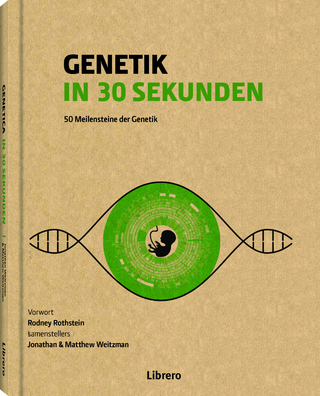
Genetic Engineering
Apple Academic Press Inc. (Verlag)
978-1-77491-269-0 (ISBN)
This new 2-volume set explores new research and perspectives in genetic engineering, which enables the precise control of the genetic composition and gene expression of organism. This powerful technology can be used for environmental sustainability, food and nutritional security, medicinal advancement, and more. Genetic Engineering aims to provide a deep understanding of the many aspects of this emerging technology and its diverse applications.
Genetic Engineering, Volume 1: Principles, Mechanism, and Expression covers genetic engineering concepts, molecular tools, and technologies utilized in the manipulation, amplification, and introgression of DNA. The volume explains the concepts of genetic engineering, enzymes of genetic engineering, and tools used in genetic engineering. It provides an introduction of recombinant DNA into host cells and discusses the linking of desired gene with DNA vector/gene cloning vector, polymerase chain reactions, the concept and nature of genes, blotting techniques, chromosome jumping, electrophoresis, genetically engineered microorganisms, and molecular markers and their applications.
Genetic Engineering, Volume 2: Applications, Bioethics, and Biosafety expresses the various appreciation and challenges of genetic engineering and issues related to bioethics and biosafety. Chapters cover the legal issues of genetic engineering, including intellectual property rights (IPR) and protection (IPP) and the patenting of living organisms, copyrights, trade secrets, and trademarks. The volume considers the safety and benefits of genetic engineering in human welfare, such as in genetically engineered Bt and Bt cotton, along with the biohazards of recombinant DNA technology. Chapters explain genetically modified organisms and microorganisms, genetic engineering of horticultural crops, genetic engineering in the agricultural sciences, and more.
This 2-volume book will be a valuable asset to upper-level students in cell biology as well as to faculty and researchers involved in genetics, molecular genetics, biochemistry, biotechnology, botany, zoology and agriculture sciences.
Tariq Ahmad Bhat, PhD, with 18 years of teaching experience, is a lecturer on botany in the Department of Education, Govt. of Jammu and Kashmir, India, and is engaged in active research of molecular biology, cell biology, mutation breeding, and genetic improvement of legumes and medicinal plants. He has published 10 international books, 90 research papers, review articles, and book chapters. He has participated in 50 conferences, training programs, and workshops. He is one of the founder faculty members of the Chief Minister’s Super 50 NEET Programme in Jammu and Kashmir, India. He is serving as the District Coordinator Anantnag of a prestigious project on medicinal plants under financial assistance of the National Medicinal Plants Board (NMPB), New Delhi (Ministry of AYUSH), India. The Government of India conferred on him a Best innovative Science Teacher Award 2014 in recognition of his meritorious services. Dr. Bhat has received his MSc and PhD from AMU, Aligarh India. Jameel M. Al-Khayri, PhD, is Professor of Plant Biotechnology at the Department of Agricultural Biotechnology, College of Agriculture and Food Sciences, King Faisal University, Saudi Arabia. He has dedicated his research efforts to date palm biotechnology for the last three decades. He has published over 60 research articles and reviews in international journals in addition to 30 book chapters. Dr. Al-Khayri is editor of several special issues of international journals on date palm, biotechnology, and sustainable agriculture under abiotic and biotic stress. He is editor of 15 Springer reference books, including Date Palm Biotechnology, Date Palm Genetic Resources and Utilization (2 volumes), Date Palm Biotechnology Protocols (2 volumes), and Advances in Plant Breeding Strategies (9 volumes). He is a member of the editorial board and reviewer panels of several international journals. He has participated in the organizing and scientific committees of international scientific conferences and contributed over 50 research presentations. In addition to teaching, graduate students advising, and conducting funded research projects, he has held administrative posts as Assistant Director of Date Palm Research Center, Head of Department of Plant Biotechnology, and Vice Dean for Development and Quality Assurance. Dr. Al-Khayri is an active member of the International Society for Horticultural Science and Society for In Vitro Biology and serves as the National Correspondent of the International Association of Plant Tissue Culture and Biotechnology. He served as a member of Majlis Ash-Shura (Saudi Arabia Legislative Council) Fifth Session. Currently, he maintains an active research program on date palm focusing on genetic transformation, secondary metabolites, and in vitro mutagenesis to enhance tolerance to abiotic and biotic stress. He is interested in the role of biotechnology in enhancing food security and the impact of global climate change on agriculture. Dr. Al-Khayri earned a BS in Biology from the University of Toledo and an MS in Agronomy and PhD in Plant Science from the University of Arkansas, USA.
VOLUME 2: APPLICATIONS, BIOETHICS AND BIOSAFETY 1. Biosafety, Intellectual Property Right (IPR), and Protection (IPP) 2. Safety and Benefits of Bt and Bt Cotton: Factures, Refute and Allegations 3. Biohazards of Recombinant DNA Technology 4. Genetic Engineering and Human Welfare 5. Genetically Modified Organisms: Scope and Challenges 6. Genetic Engineering of Horticultural Crops 7. Genetically Engineered Microorganisms 8. Patenting of Living Organisms and Its Significance, Copyrights, Trade Secrets, and Trademarks 9. Negative Impact of Recombinant DNA Technology on Life 10. Genetics Engineering and Agricultural Sciences 11. Construction of Recombinant DNA 12. Genetically Modified Organisms: Concerns and Biosafety
| Erscheinungsdatum | 19.09.2023 |
|---|---|
| Zusatzinfo | 8 Tables, black and white; 14 Line drawings, color; 18 Line drawings, black and white; 3 Halftones, color; 2 Halftones, black and white; 17 Illustrations, color; 20 Illustrations, black and white |
| Verlagsort | Oakville |
| Sprache | englisch |
| Maße | 152 x 229 mm |
| Gewicht | 612 g |
| Themenwelt | Schulbuch / Wörterbuch |
| Naturwissenschaften ► Biologie ► Genetik / Molekularbiologie | |
| Sozialwissenschaften ► Soziologie | |
| Technik ► Umwelttechnik / Biotechnologie | |
| ISBN-10 | 1-77491-269-4 / 1774912694 |
| ISBN-13 | 978-1-77491-269-0 / 9781774912690 |
| Zustand | Neuware |
| Informationen gemäß Produktsicherheitsverordnung (GPSR) | |
| Haben Sie eine Frage zum Produkt? |
aus dem Bereich


